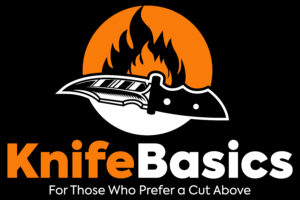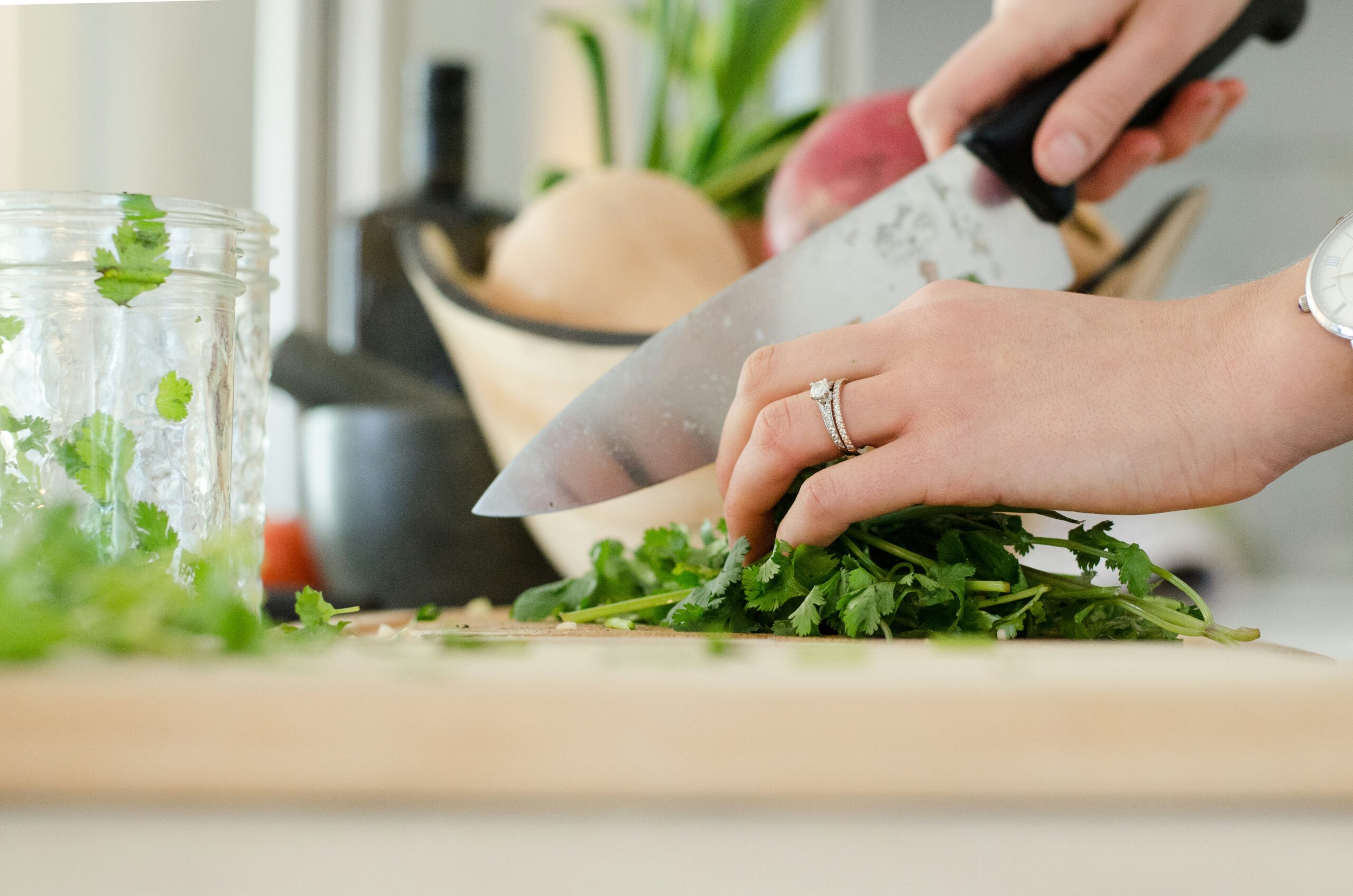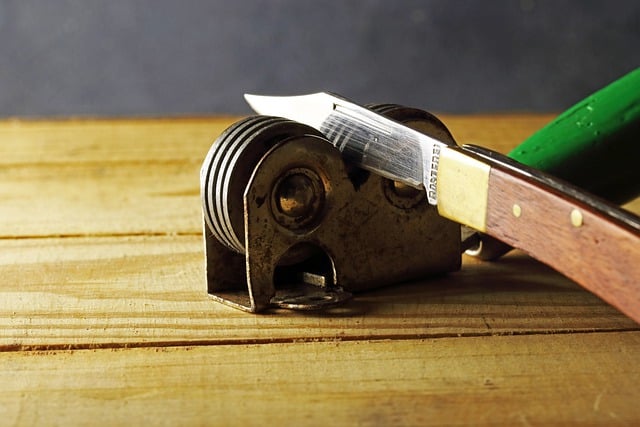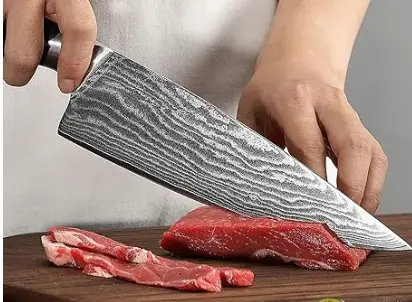Introduction to Damascus Kitchen Knives
Damascus kitchen knives have long been revered for their remarkable beauty, unmatched sharpness, and enduring durability. Originating from an ancient technique in the Near East, these knives are not only functional tools but also masterpieces of craftsmanship. The term “Damascus” itself emanates from the historic city of Damascus in Syria, synonymous with quality and rich artisan traditions dating back centuries.
Historically, the distinction of a Damascus knife lies in its intricate patterning, a hallmark of the unique forging process that involves layering different types of steel. This practice results in a blade that showcases mesmerizing wave-like patterns, often referred to as “watered” or “flowing” designs. These patterns are not merely decorative; they signify the blade’s composite structure, which enhances both strength and flexibility.
The cultural significance of kitchen knives Damascus cannot be overstated. In many cultures, they are considered a symbol of mastery and dedication to the culinary arts. Renowned for their ability to retain an incredibly sharp edge, chefs and culinary enthusiasts value these knives for their precision and reliability in the kitchen.
Beyond their utility, Damascus kitchen knives are prized collectors’ items. The intricate patterns and superior make of these blades offer a perfect blend of aesthetics and performance, making them a popular choice among knife aficionados and serious cooks. The allure of owning a knife that melds historical tradition with modern functionality is undeniable.
This guide aims to delve deeper into the elements that make Damascus kitchen knives so exceptional. From their historical roots to the technical intricacies that set them apart, we will explore why these knives are a testament to both ancient and contemporary craftsmanship.
The Craftsmanship and History Behind Damascus Steel
The origins of Damascus steel can be traced back to as early as 4th century AD, primarily in the regions known today as India and the Middle East. Renowned for its captivating wavy patterns and unparalleled strength, Damascus steel was fashioned into various weapons and tools, prized for both their beauty and durability. The distinctive wavy patterns, often compared to flowing water, are more than mere aesthetics; they are a testament to the intricate forging process that melds layers of steel together, creating a composite material of unique properties.
The traditional forging process of Damascus steel involved a technique known as “pattern welding,” where blacksmiths would fold together multiple layers of high-carbon steel and iron, then repeatedly heat and hammer them out. This meticulous craftsmanship resulted in blades that were not only resilient but also capable of holding a sharp edge for a considerably longer period. The ancient blacksmiths employed a type of steel known as “wootz,” from South India, which contained microcarbides that played a significant role in developing the distinct patterns upon forging.
Over centuries, the knowledge and techniques behind Damascus steel fabrication were refined and preserved, although some original methods were lost with time. Modern advancements have rekindled interest in this ancient art, leading to a revival that blends classic techniques with contemporary metallurgical innovations. Today’s Damascus kitchen knives harness the same principles of layering and folding, albeit with improved precision and material quality. High-carbon stainless steel, for example, offers not only robustness but also enhanced resistance to corrosion and wear.
Thus, the ongoing evolution of Damascus steel showcases a harmonious blend of tradition and progress. Each kitchen knife made from Damascus steel carries within it a rich historical tapestry, while offering modern-day functionality and reliability. For culinary enthusiasts and professional chefs, owning and using a Damascus kitchen knife is both a privilege and a nod to centuries of skilled craftsmanship.
Characteristics of Damascus Kitchen Knives
Damascus kitchen knives are widely celebrated for their distinctive qualities, making them highly desirable in culinary circles. One of the primary characteristics of these knives is their remarkable sharpness. The intricate layering process used in crafting Damascus steel results in an exceptionally fine edge capable of making precise, clean cuts with minimal effort. This sharpness is further complemented by the durability inherent in Damascus kitchen knives. The unique forging technique creates a blade that is both strong and resilient, ensuring longevity even with regular use.
In addition to their sharpness and durability, the aesthetic appeal of Damascus kitchen knives sets them apart. The distinctive wavy patterns on the blade, often referred to as “Damascus patterns”, are not only visually stunning but are also a testament to the intricate craftsmanship involved in their creation. These patterns are a result of the multiple layers of steel folded and forged together, a process that combines functionality with beauty.
The benefits of using Damascus kitchen knives in culinary preparation are substantial. Their sharp and precise cutting edges facilitate tasks such as slicing delicate tomatoes or chopping dense root vegetables with equal ease. Professional chefs and home cooks alike appreciate the efficiency and control these knives provide, leading to a more enjoyable and productive cooking experience. Furthermore, the long-lasting edges of Damascus knives mean they require less frequent sharpening compared to many other types of kitchen knives, adding to their value and convenience.
Overall, the combination of sharpness, durability, and stunning aesthetic design positions Damascus kitchen knives as an essential tool for any kitchen. They not only enhance the performance and efficiency of culinary tasks but also bring a touch of elegance to the cooking environment.
Types of Damascus Kitchen Knives
When exploring the world of Damascus kitchen knives, it is essential to recognize the diverse array of knife types available. Each knife serves a unique purpose, tailored to various culinary tasks, ensuring that every cook has the right tool for the job. This section will elucidate the distinct types of Damascus kitchen knives and their specific uses.
Chef’s Knife: The chef’s knife is arguably the most versatile and commonly used kitchen knife. With a broad blade that typically ranges from 8 to 10 inches, it excels in chopping, slicing, dicing, and mincing various ingredients. The Damascus steel adds an aesthetic appeal and enhances edge retention, making it an indispensable tool in both professional and home kitchens.
Paring Knife: Smaller in size, usually with a blade length of 3 to 4 inches, the paring knife is perfect for intricate tasks that require precision. It is ideal for peeling, trimming, and making delicate cuts on fruits and vegetables. The finely honed Damascus steel blade ensures that even the smallest details are handled with accuracy and ease.
Bread Knife: Characterized by its serrated edge, the bread knife is designed to slice through crusty loaves without crushing the soft interior. The typical blade length is around 8 inches. The use of Damascus steel in bread knives not only adds a visually striking element but also improves the knife’s longevity and cutting prowess.
Santoku Knife: Originating from Japan, the Santoku knife features a shorter, wider blade compared to the traditional chef’s knife, usually between 5 to 7 inches. It is excellent for slicing, dicing, and mincing. The Damascus steel’s hardness ensures that the Santoku knife remains sharp and effective through extended use, making it a favorite among many culinary enthusiasts.
Specialty Knives: Beyond the standard kitchen knives, there are various specialty Damascus knives tailored for specific tasks. Boning knives, with their slender, flexible blades, are perfect for deboning meat and poultry. Similarly, utility knives and fillet knives offer specialized functions for more precise slicing and filleting tasks. The intricate patterning and superior performance of Damascus steel enhance these specialty blades, making them prized tools in any sophisticated kitchen.
Understanding the wide range of Damascus kitchen knives allows culinary aficionados to select the perfect blade for their specific needs, ensuring optimal performance and an enhanced cooking experience.
- 【 Japanese Steel Knife】67-layer Damascus knife with 0.98% carbon & 18% chromium content, lead hardness at 58HRC. Each Japanese chef knife is hand-forged by experienced blacksmiths with premium Damascus steel to ensure higher sharpness, higher wear resistance, durability and hardness.
- 【 Real Damascus Knife 】The chef knife has laser-controlled precision sharpening for knife at 15° edge, which giving it a better working angle when cutting. The 67-layer Damascus cladding ensures durability while adding elegant, rust-proof patterns—perfect for both professional kitchens and home use.
- 【Razor-Sharp Kitchen Knife】Laser-calibrated 15° cutting bevel,our chef knives are hand-sharpened using time-honored Japanese techniques, allowing them to glide effortlessly through meat, fish, and vegetables with surgical precision. Experience razor-sharp performance straight out of the box—engineered to maintain their edge far longer than ordinary kitchen knives.
- 【 Comfortable Grip & Solid】Made of CALABRIAN Oliva Wood, the kitchen knife handle is more comfortable and sturdy. Organic shape is suitable for any size of hand, and the half-bolster deisgn allows you to hold the knife easily and cut food effortlessly.
- 【 Best Gift and Lifetime Warranty】The chef knife has pretty wooden box,which is prepared as exquisite gift to dearest whom. Each EOMJOY knife set are backed by excellent quality and undergo strict quality inspection, we provide a lifetime warranty for every customer, please feel free to purchase.
- Enduring & Excellence Sharpness: Professional, the satin-finished blade has precision cutting and is finely honed. Each knife's edge of Piklohas is hand-polished and precisely achieves 15 degrees per side for maximum sharpness, with Rockwell hardness of 58, extraordinary properties, and edge retention.
- Ergonomic Handle For Comfort: Full tang and forged bolster for superb robustness and creating the perfect balance between the blade and handle. This unique shape is ergonomically crafted for optimum comfort, control, and agility. And minimizes fatigue, finger numbness, or aches after continuously holding it for an extended time.
- Quality Manufacturing, Rust And Corrosion Resistant: Piklohas cutting knife is German top grade X50CrMoV15 high carbon steel with precision quenching and vacuum cold nitrogen treatment. It dramatically enhances the characteristics of corrosion resistance, rust prevention, and toughness, which can withstand high-frequency use.
- Space-Saving Design Of Magnet Knife Block: The double-sided magnetic design can easily hold up to 21 pieces of cutting tools, keeping your kitchen countertop clean and organized. The knife holder helps you secure your knives vertically without pushing them into a wooden, hard plastic, or metal block, which helps reduce scratches on the blade and damage to the edge.
- Perfect Kitchenware Gift Idea: This set of German knives combines high-end materials and first-class craftsmanship. With the blade's distinctive Damascus pattern, the triple-riveted handle, and the power of the knife holder, it is a unique gift for family and friends on birthdays, weddings, and housewarming parties.
- 【Damascus Kitchen Knife Set】 3 pieces damascus chef knife set meet all your cooking needs. This kitchen knife set includes 8" chef knife, 7" santoku knife, 3.5" paring knife, which is ideal for your daily cooking, cutting vegetables, fruit, bread, fish fillets or meat.
- 【 Real Damascus Knife 】The chef knife has laser-controlled precision sharpening for knife at 15° edge, which giving it a better working angle when cutting. The 67-layer Damascus cladding ensures durability while adding elegant, rust-proof patterns—perfect for both professional kitchens and home use.
- 【 Japanese Steel Knife】67-layer Damascus knife with 0.98% carbon & 18% chromium content, lead hardness at 58HRC. Each Japanese chef knife is hand-forged by experienced blacksmiths with premium Damascus steel to ensure higher sharpness, higher wear resistance, durability and hardness.
- 【 Comfortable Grip & Solid】Made of CALABRIAN Oliva Wood, the kitchen knife handle is more comfortable and sturdy. Organic shape is suitable for any size of hand, and the half-bolster deisgn allows you to hold the knife easily and cut food effortlessly.
- 【 Best Gift and Lifetime Warranty】The chef knife set have the pretty wooden box,which is prepared as exquisite gift to dearest whom. Each EOMJOY knife set are backed by excellent quality and undergo strict quality inspection, we provide a lifetime warranty for every customer, please feel free to purchase.
How to Choose a Damascus Kitchen Knife
When selecting a Damascus kitchen knife, various factors contribute to making an informed purchase. The first consideration is the blade type. Damascus blades are highly valued for their intricate wave-like patterns and multi-layered steel construction, providing both aesthetic appeal and exceptional cutting performance. It’s essential to evaluate the knife’s primary purpose, whether it’s for general use, specialized tasks, or culinary precision. Chef’s knives, santoku knives, and paring knives each bring distinct advantages depending on the intended use.
The handle material is another crucial aspect. Common options include wood, G10 (fiberglass), and pakkawood. Wood handles offer traditional aesthetics and a comfortable grip, though they may require more maintenance. G10 and pakkawood are praised for their durability and resistance to moisture. Select a handle that feels comfortable in your hand and provides a secure grip, which enhances overall control during usage.
Weight and balance significantly influence a knife’s functionality and user experience. A well-balanced kitchen knife, particularly one made from Damascus steel, ensures a smooth and enjoyable cutting motion. Test the knife by holding it in your hand; it should feel natural and neither too heavy nor too light. Optimal balance typically centers around the bolster, allowing for efficient and precise cutting.
Brand reputation is pivotal in guaranteeing the quality of a Damascus kitchen knife. Brands with a longstanding history and positive reviews are often a safer investment, as they likely maintain higher standards of craftsmanship and quality control. Researching user reviews and expert opinions can provide valuable insights into a brand’s reliability.
Authenticity and quality assurance are paramount. Genuine Damascus kitchen knives exhibit consistent and well-defined patterns indicative of true multiple-layered steel, not just surface etching. Purchasing from reputable sellers and checking for certifications or guarantees can help verify the knife’s authenticity. Remember, the hallmark of exceptional kitchen knives Damascus lies in their craftsmanship, functionality, and durability, making these factors key to making a wise choice.
Maintenance and Care for Damascus Kitchen Knives
Proper maintenance and care for Damascus kitchen knives are paramount to preserving their intricate patterns and optimal performance. These knives, known for their unique, wavy designs and superior cutting abilities, require meticulous attention to remain in pristine condition. Failure to maintain them adequately can result in dull blades and, ultimately, compromised functionality.
To begin with, cleaning Damascus kitchen knives immediately after use is crucial. Hand wash the knives with mild soap and warm water, avoiding any harsh detergents or abrasive sponges that may mar the blade’s surface. Rinse thoroughly and dry with a soft cloth to prevent water spots or rust, which can be detrimental to the knives’ longevity.
Sharpening these knives is another essential aspect of their care. Regular sharpening ensures that the edge remains keen and effective. While professionals often recommend using a whetstone for this purpose, one can also employ fine ceramic rods in a pinch. It’s important to maintain a consistent angle—generally around 15-20 degrees—while sharpening to avoid damaging the blade’s distinctive pattern and structure.
Proper storage is integral in protecting Damascus kitchen knives from potential damage. These knives should never be tossed into a drawer with other utensils. Instead, consider using a magnetic knife strip, knife block, or blade guards to store them safely. Such storage practices not only prevent nicks and dings but also keep the knives readily accessible and organized.
Additionally, periodic oiling with food-safe mineral oil can help maintain the lustrous appearance of the Damascus steel and protect it from moisture-induced tarnish. A light coating applied with a soft cloth will suffice, ensuring the blade remains both visually appealing and protected.
By adhering to these maintenance and care practices— meticulous cleaning, regular sharpening, proper storage, and occasional oiling—damascus kitchen knives will retain their aesthetic charm and functional sharpness for many years to come.
Benefits and Drawbacks of Damascus Kitchen Knives
Damascus kitchen knives are renowned for their remarkable cutting ability, a characteristic that stems from their unique construction. The distinctive pattern, forged through the repeated folding of different steels, results in blades that exhibit both exceptional sharpness and durability. This multilayer composition enhances the knife’s resilience, enabling it to maintain its edge longer compared to many conventional blades.
Another significant advantage of kitchen knives Damascus is their aesthetic appeal. The intricate, wavy patterns etched into the steel are not just visually striking but also reflect a deep tradition of craftsmanship. This makes them not only functional tools but also objects of admiration and conversation pieces in culinary circles.
However, the benefits of Damascus kitchen knives come with certain drawbacks. One primary concern is their cost. The detailed process of creating these blades, which involves skilled labor and high-quality materials, results in a higher price point. For many culinary enthusiasts, the investment is justified by the knife’s performance and longevity, but it may be prohibitive for those on a tighter budget.
Furthermore, Damascus kitchen knives require regular maintenance to preserve their condition and performance. Unlike some modern knives that are designed for minimal upkeep, Damascus blades demand consistent attention to prevent rust and corrosion. This includes proper cleaning, drying, and occasional oiling. For users willing to invest the time and effort, these maintenance routines contribute to the extended lifespan of the knife.
In essence, while kitchen knives Damascus offer unmatched cutting efficiency and a unique aesthetic that stands the test of time, prospective buyers must weigh these attributes against the higher cost and dedicated maintenance required. By understanding both the benefits and the potential drawbacks, readers can make informed decisions that best suit their culinary needs and preferences.
Conclusion and Final Thoughts
Throughout this article, we’ve delved into the unique allure and exceptional qualities of Damascus kitchen knives. We’ve explored their historical significance, intricate craftsmanship, and the sheer functional superiority they offer in daily culinary tasks. These knives are not mere kitchen tools; they are a blend of art and utility that stand the test of time, thanks to the unique forging process that imparts both strength and flexibility.
One of the standout features of Damascus kitchen knives is their remarkable cutting edge. Crafted meticulously, these knives retain sharpness far longer than conventional ones, reducing the frequency of honing and sharpening. The layered steel not only adds to the durability but also contributes to a visually striking pattern that is both elegant and unique to each knife, making them a prized addition to any kitchen collection.
The balance and ergonomic design of Damascus knives ensure that they are comfortable to use, reducing hand fatigue during extended periods of kitchen work. This makes them a preferred choice among both professional chefs and home cooks who seek performance without compromising on comfort. The careful attention to handle design also ensures a secure grip, which is essential for precise cuts.
Furthermore, investing in kitchen knives Damascus is a wise decision for those who value long-lasting quality. The multi-layered steel construction not only enhances performance but also guards against corrosion, ensuring that these knives remain a staple in your kitchen for years to come. The combination of functionality and visual appeal makes Damascus knives an elegant statement of both culinary expertise and aesthetic sensibility.
We encourage you to consider incorporating these extraordinary knives into your culinary arsenal. Their unique blend of functionality and artistry will not only elevate your cooking experience but also bring a touch of timeless elegance to your kitchen. By choosing Damascus kitchen knives, you invest in a heritage of craftsmanship that embodies both tradition and innovation.






